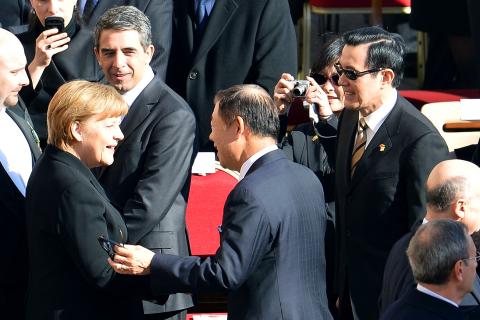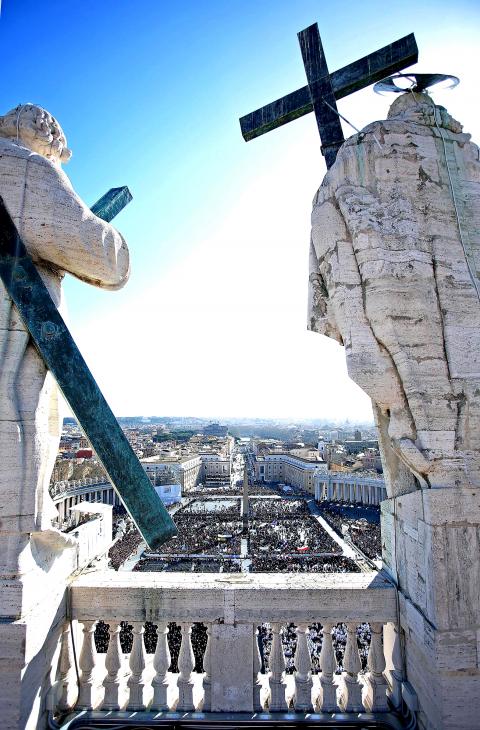President Ma Ying-jeou (馬英九) yesterday stood among his counterparts from other countries in St Peter’s Square to attend Pope Francis’ inauguration Mass.
Ma and first lady Chow Mei-ching (周美青) sat in one of the rows reserved for heads of state. On Ma’s right was Costa Rican President Laura Chinchilla, while Chilean President Sebastian Pinera was on Chow’s left.
Aside from the five-person Taiwanese delegation led by Ma, others in the VIP section included German Chancellor Angela Merkel, US Vice President Joe Biden, Argentine President Cristina Fernandez, Zimbabwean President Robert Mugabe, Prince Albert of Monaco and Bahraini Prince Sheik Abdullah bin Hamad bin Isa Al Khalifa.

Photo: AFP
Prior to the ceremony, Ma was seen having a brief exchange with other heads of state, including Merkel and Biden.
After the Mass, Ma and Chow offered their congratulations to Francis during a brief audience.
The Vatican is Taiwan’s only diplomatic ally in Europe. The two countries have maintained diplomatic ties since 1942.

Photo: EPA
Ministry of Foreign Affairs deputy spokesman Calvin Ho (何震寰) said that while the purpose of Ma’s visit was to attend the inaugural Mass, he would not rule out unofficial interaction with other world leaders, especially since Ma is staying at the same hotel as many of them.
The first couple arrived in Rome on Monday and toured the Vatican Museums and St Paul’s Cathedral before visiting the Taipei Representative Office in Italy. In the evening, Ma and the first lady hosted a dinner for the clergy and Taiwanese expatriates living in Italy, as well as for a Catholic delegation from Taiwan.
Ma said that the Republic of China and the Holy See have long cooperated in religious and humanitarian fields, adding that bilateral ties are progressing continually.
The last time a Taiwanese president visited the Vatican was in 2005, when then-president Chen Shui-bian (陳水扁) attended the funeral of pope John Paul II.
At the time, an incensed Beijing refused to send a representative to the funeral and filed a protest with Italy for issuing Chen a visa.
This time, China appeared to again be boycotting the inauguration because of Taiwan’s presence, but the Vatican has emphasized it did not send out specific invitations to any countries.
“No one is privileged, no one is refused, everyone is welcome if they say they are coming,” Vatican spokesman Federico Lombardi said.
Li Xiaoyong, spokesman for the Chinese embassy in Rome, said: “There will be no delegation from China. China has expressed its congratulations.”
Bernardo Cervellera, the Rome director of AsiaNews, said the Chinese reaction was “like a broken record — it masks the fact that they do not really know what to do.”

MAKING WAVES: China’s maritime militia could become a nontraditional threat in war, clogging up shipping lanes to prevent US or Japanese intervention, a report said About 1,900 Chinese ships flying flags of convenience and fishing vessels that participated in China’s military exercises around Taiwan last month and in January have been listed for monitoring, Coast Guard Administration (CGA) Deputy Director-General Hsieh Ching-chin (謝慶欽) said yesterday. Following amendments to the Commercial Port Act (商港法) and the Law of Ships (船舶法) last month, the CGA can designate possible berthing areas or deny ports of call for vessels suspected of loitering around areas where undersea cables can be accessed, Oceans Affairs Council Minister Kuan Bi-ling (管碧玲) said. The list of suspected ships, originally 300, had risen to about 1,900 as

Japan’s strategic alliance with the US would collapse if Tokyo were to turn away from a conflict in Taiwan, Japanese Prime Minister Sanae Takaichi said yesterday, but distanced herself from previous comments that suggested a possible military response in such an event. Takaichi expressed her latest views on a nationally broadcast TV program late on Monday, where an opposition party leader criticized her for igniting tensions with China with the earlier remarks. Ties between Japan and China have sunk to the worst level in years after Takaichi said in November that a hypothetical Chinese attack on Taiwan could bring about a Japanese

MORE RESPONSIBILITY: Draftees would be expected to fight alongside professional soldiers, likely requiring the transformation of some training brigades into combat units The armed forces are to start incorporating new conscripts into combined arms brigades this year to enhance combat readiness, the Executive Yuan’s latest policy report said. The new policy would affect Taiwanese men entering the military for their compulsory service, which was extended to one year under reforms by then-president Tsai Ing-wen (蔡英文) in 2022. The conscripts would be trained to operate machine guns, uncrewed aerial vehicles, anti-tank guided missile launchers and Stinger air defense systems, the report said, adding that the basic training would be lengthened to eight weeks. After basic training, conscripts would be sorted into infantry battalions that would take

DEEP-STRIKE CAPABILITY: The scenario simulated a PLA drill that turned into an assault on Taiwan’s critical infrastructure, with the launchers providing fire support Taiwan yesterday conducted this year’s first military exercises at Longsiang Base in Taichung, demonstrating the newly acquired High Mobility Artillery Rocket System’s (HIMARS) ability to provide fire support and deep-strike capabilities. The scenario simulated an attack on Penghu County, with HIMARS trucks immediately rolling into designated launch areas and firing barrages at the Wangan (望安) and Cimei (七美) islands, simulating the provision of fire support against invading forces. The HIMARS are supposed to “fire and leave,” which would significantly increase personnel and equipment survivability, a military official said. The drill simulated an exercise launched by the Chinese People’s Liberation Army (PLA) Eastern